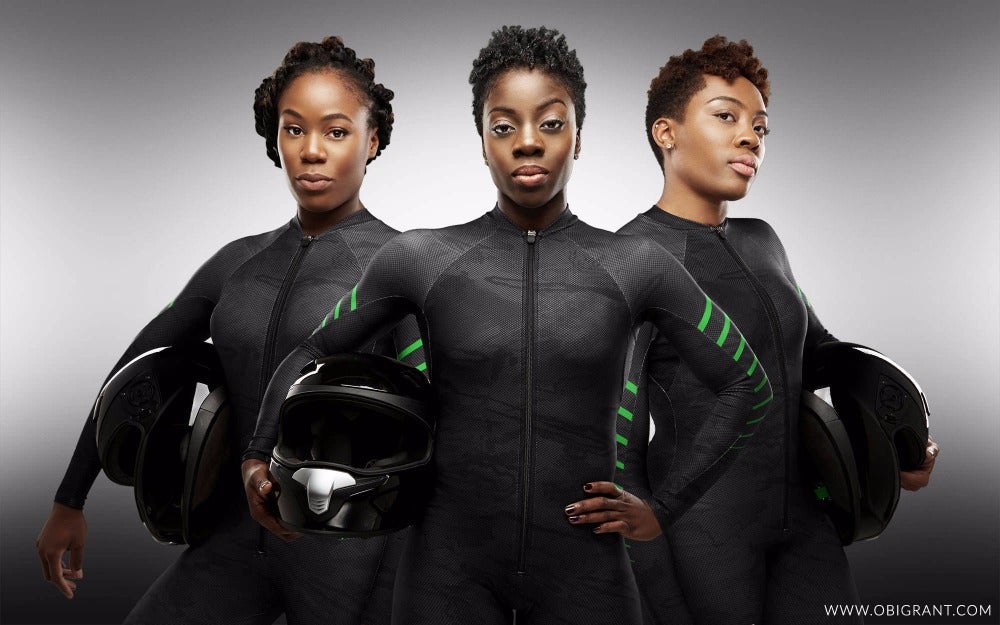
Black women athletes showed up and showed out in the 2016 Olympic Games, and slayed on a global scale.
But if Akuoma Omeoga, Ngozi Onwumere, and Seun Adigun have their say, the excellence won’t end in Rio. The first-generation American women are on a quest to create Nigeria’s first women’s bobsled team.
It will mark the first representation in the sport for the country as well as the continent of Africa.
However, building a team from scratch isn’t enough; their goal is to make it to the 2018 Winter Olympics. It sounds more incredible when you consider that Adigun, the team’s driver, built herself a wooden bobsled by hand and just started training last year. As the driver, or leader of the team, she travels to colder climates for training and brings what she learns back to her teammates, who live in the Houston area.
According to Adigun, “The fate of Nigeria’s eligibility to be represented in the 2018 Winter Olympics rests exclusively on my ability to qualify as a competent driver.” That should give the country hope, because they could not be in more competent hands.
Just look at her (literal) track record: The lifelong athlete competed in track & field for the University of Houston, became a three-time 100m hurdle National Champion for Nigeria, and ran in the 2012 Olympics. But after a disappointing finish, she turned her attention to coaching for her alma mater.
Subscribe to our daily newsletter for the latest in hair, beauty, style and celebrity news.
But the competitive bug wouldn’t leave her alone. She looked to colleagues Lolo Jones, Aja Evans, Lauryn Williams, and Cherrelle Garrett, all Black female Olympians who transitioned from track to bobsledding, and decided she could do it, too. In just her first season of training, Adigun earned a spot on the U.S. Women’s Team. We shouldn’t fail to mention that she’s also pursuing a Doctorate of Chiropractic from Texas Chiropractic College and a dual degree Masters of Science from University of Houston.
“I really had to sit down and think this through because I was like, ‘you know what, Seun, you’re only one person and you’re about to try and start a federation for an entire continent and you’re in chiropractic school and you’re trying to get this dual degree — are you crazy? You can’t pick all that up; that’s not humanly possible!’” she tells ESSENCE. “But my heart was like, ‘No, Seun, the humanitarian in you has to do this.’”
Because they trust in Adigun and her spirit of determination, Onwumere and Omeoga came aboard to serve as her brakemen. It’s a complete leap of faith, as Onwumere admits, “to be completely honest, I didn’t even know what bobsled was. I knew it was a sport most retired track and field athletes found interest in but never knew I would be competing.”
“I never had interest in the sport in the sense that I didn’t think I would be one to ever participate in the sport…[it] had graced my brain before, more so as spectator rather than an athlete,” Omeoga added.
Team Nigeria hopes to compete in their first meet in January, but they will need a little help. They’ve started a GoFundMe campaign, with a goal of $150,000. They say that if they can even raise $15,000 to $20,000 between now and their first race, that will be enough for a starter sled, uniforms, and snow gear.
“I think people can create misconceptions when people are fundraising, as if the country’s not supportive. No, the country’s actually in full support,” Adigun says. “Nigeria is super excited about it. The Nigerian Olympic Committee is all on board. Everybody’s ready to try and reach these heights together, but the reality of it is that the sport itself is very geared toward self-funding because of the fact that it’s more an endorsement-geared sport. So if you don’t have a whole bunch of endorsements, then you have to generate your own funds for the most part.”
The current bobsled season ends in March. Next season is technically when Olympic trials begin, so if they continue at their current pace, the women have a good chance of reaching their dream. In the meantime, they plan to keep training and working hard because they all see the potential to create something bigger than themselves.
“This goes far beyond me, and I think that’s what makes this whole experience so beautiful,” Onwumere says. “Everything I’ve ever done before athletically has been for myself, from collegiate track to competing professionally in track…all about me. Going to the Winter Olympics and being able to not only put a country but an entire continent on our backs is surreal. We see Nigeria’s greatness unfolding and the opportunity to build up our youth as well as we construct new roads that have not been traveled in Africa.”
Go here to support their campaign, and follow their pursuit on social media via #NigeriaBobsled.
Editors Note: The team was licensed and cleared to race shortly after the publication of this article.
